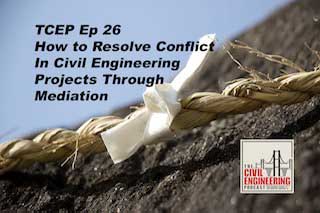Podcast – How do engineers prepare for mediation?
How does an civil engineer prepare for mediation? With over 750,000 downloads of the Engineering Career Coach’s podcast, I was honored to be interviewed regarding the use of mediation in civil engineering and construction disputes by Chris Knutson, P.E.
The link to the podcast:
It was a wide ranging interview and all that we talked about couldn’t be included in the podcast. Therefore the following is a more detailed question and answer:
What sort of civil engineering or construction disputes typically go to mediation? What type of disputes would you say aren’t right for mediation and are better handled through litigation?
Let me answer that in a roundabout way.
In Fresno, California there is a court sanctioned program to mediate between the victims of crimes and the criminals. It is called a Victim Offender Reconciliation program. It is used to determine sentencing.
A friend of mine is working in maximum security women’s prison teaching mediation techniques to the women sentenced to life so that they can mediate disputes within the prison.
Last year I mediated a case in which the underlining dispute was murder.
None of these have anything to do with engineering, but I don’t see any engineering dispute more difficult to resolve. I routinely deal with these types of disputes: employment, contract, professional liability, construction defect, and environmental issues.
How many parties can participate in meditation? Are each represented by their own counsel?
The simple answer is that all of the stakeholders in the dispute should be present. More specifically, each stakeholder’s decision makers should be present.
The key purpose of mediation is for you and your opponent to tell their story as to why we are here at mediation. Everyone needs to see the other side; to listen to them; and to be heard by them. Don’t forget that body language also communicates aggressiveness or sincerity in finding a solution. All sides need to see and make a connection with each other. Communication is key to finding a solution.
Others that may attend the mediation are the experts. They can be present to give analysis so that each side can judge the credibility of the others experts. You might also have financial accountants and tax advisers depending on the nature of the dispute. In more complex cases you might have computer simulations. Basically anyone who can assist your attorney in convincing the other side to your point of view should be part of your team.
Usually, each side has legal representation. Do not forget insurance representatives. Make sure to involve them.
Other candidates for attendance:
• Insurance adjustors
• Cumis counsel
• CEO and/or HR Director
• Silent partners in business
• Investors
• Overseas stakeholders
How does a firm, or an individual, prepare for a mediation?
There are four major steps in preparation for mediation.
Preparing yourself, your Expectations and Realities.
• You need to recognize that mediation may be your “best and only day in court.”
• What do you intend to communicate at the mediation session?
• Determine the goals, needs and interests.
• Determine the Risks v. Benefits – emotional and economic.
• Determine “Best alternative to a negotiated agreement.” and “Worst alternative to a negotiated agreement”.
• Develop different “settlement scenarios”.
• Finally – recognizing the other side’s interests.
Preparing your attorney
• Defining the issues with them
• Make sure you both understanding the facts and the law.
• Prepare a decision tree analysis, if helpful.
• Find out how your attorney wants to show case you. This is important if the other side has never met you.
Preparing the Opposition Attorney, Adjuster, CEO or Other Decision-Makers/Stakeholders
• Don’t burn bridges! Be polite and collaborative. Seek a “win-win” solution.
• Recognize that they are key players, have egos and have to justify any settlement with their bosses.
• Make it easy for them to give you what you want. Don’t hide anything.
• Provide all decision-makers with enough information well before the mediation session. Tell them what you want and why you want it.
• Send copies of the mediation brief and other information to them with the request that it is sent to the adjuster and/or other stakeholders.
Preparing the Mediator
• Educate me!
• Be willing to engage in pre-session teleconferences. Remember mediation is a process, not an event.
• Make sure that the right people attend.
• What discovery issues still remain unresolved?
• Who do you want the opposition to bring to the mediation? The mediator may not be aware of the silent stakeholder or cumus council.
• Consider site visits and other pre-session preparation. And that the mediator may talk to the adjustor, other stakeholders or witnesses.
 About the Author: Ken Strongman (www.kpstrongman.com) has years of experience and a growing national reputation as a mediator and arbitrator. He has successfully resolved more than a thousand disputes in the fields of construction defects, real estate, intellectual property, and employment. He is also a Mediator and Arbitrator for FINRA.
About the Author: Ken Strongman (www.kpstrongman.com) has years of experience and a growing national reputation as a mediator and arbitrator. He has successfully resolved more than a thousand disputes in the fields of construction defects, real estate, intellectual property, and employment. He is also a Mediator and Arbitrator for FINRA.
© 2020 Ken Strongman. All Rights Reserved. Please do not copy or repost without permission.
